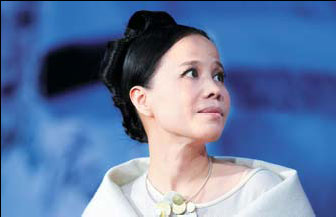
Dadawa is an ambassador for Chinese ethnic groups music. Zou Hong / China Daily
Zhu Zheqin's four-month tour of the remote regions of western China in 2009 was a revelation. The singer, who is known as Dadawa in the West, visited ancient forest tribes and nomads, recording their music along the way.
"I thought, this is the best music to hear in the world," Dadawa says.
The result is Dadawa's latest production, Hear The World - Dadawa and Ethnic Music Masters 2010 Tour, which begins in Hong Kong on Oct 15, plays Beijing's National Center for the Performing Arts on Oct 20, and will also take in Shanghai and Hangzhou.
She says the show features "authentic" music by ethnic groups, which are generally ignored by metropolitan audiences.
On her journey she recorded more than 1,000 ethnic songs from places like Guizhou, Yunnan, Xinjiang, Inner Mongolia and Tibet, which she regards as invaluable.
Fei Ge, or the "flying songs" of the Miao people, captivated her when she arrived at a remote village in Guizhou province.
"I saw some girls wearing traditional clothes singing high-pitched songs, a call to their long-distance lovers," she recalls. "I just could not get them out of my head."
Musical instruments from these places, such as a hand-made horse-head fiddle, mouth harp, kanun (a tambourine from Xinjiang Uygur autonomous region) and even tree leaves used by Guizhou's ethnic groups, will also be played at the concerts by ethnic musicians.
When Dadawa and her team arrived at Ili in Xinjiang, near the Kazakhstan border, she found a Kazak dombra musician.
"He played his dombra until 3 am and we had such a good time," recalls Dadawa, saying she has invited him to play at her concerts.
Along with ethnic singers, Dadawa will also present Muqam, an ancient Uygur melody, and The Epic of King Gesar, from Tibet.
"Listening to these musicians you can almost see the mountains, rivers, and grasslands where they live," she says. "I want to use my position to spread their cultures. I want the world to see their treasures, which deserve respect and protection."
"Their musical roots are deep in their cultures and have been passed on for generations," she says.
Born in Guangzhou, Guangdong province, Dadawa grew up with Cantonese pop music. Unlike others who imitated the Hong Kong singers, Dadawa had a love of folk music.
